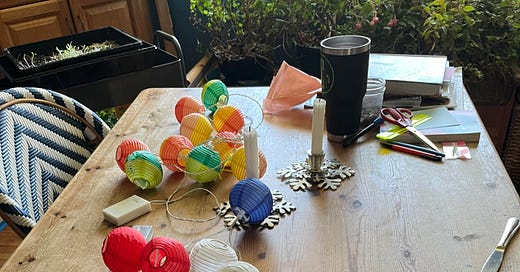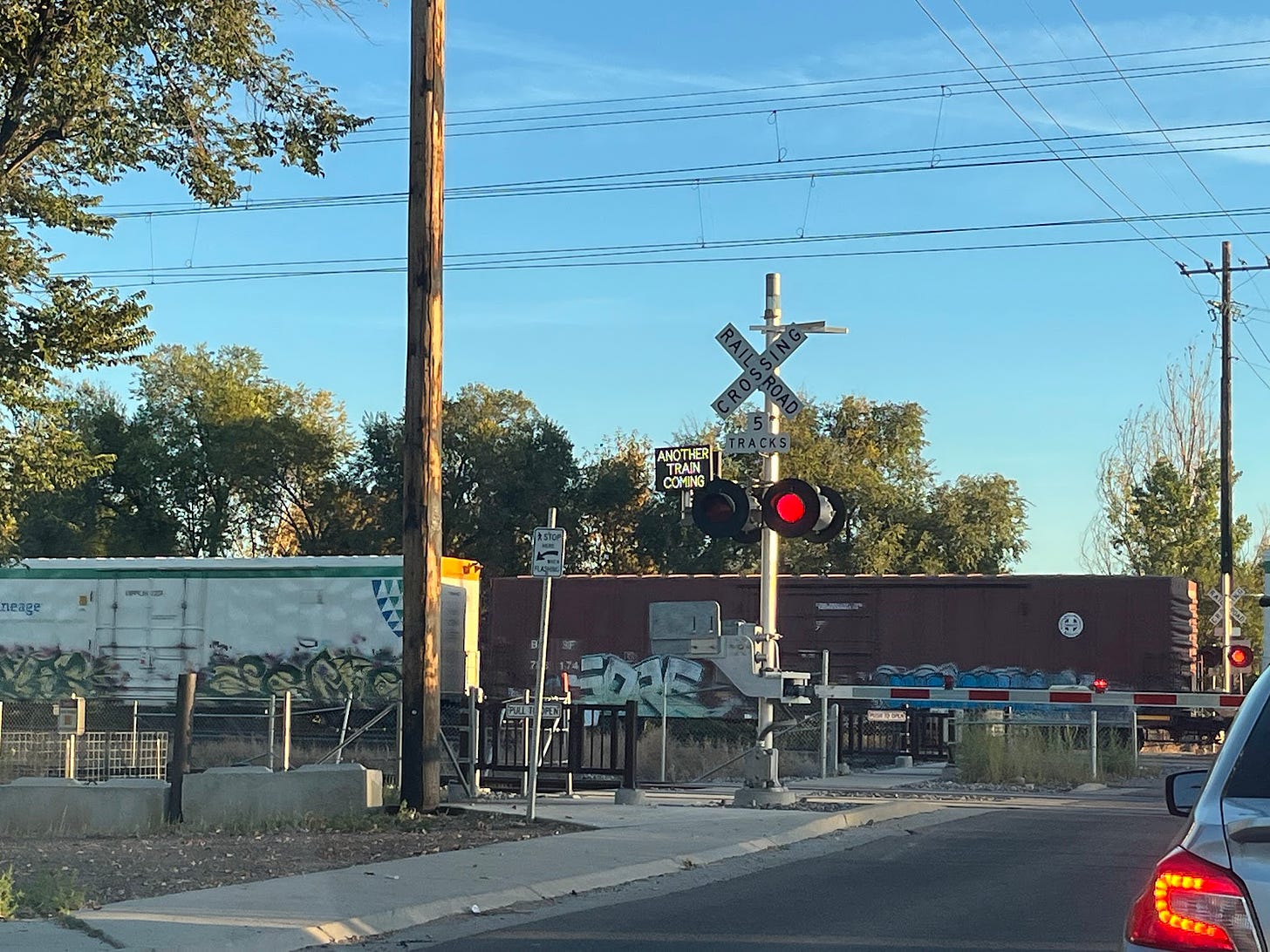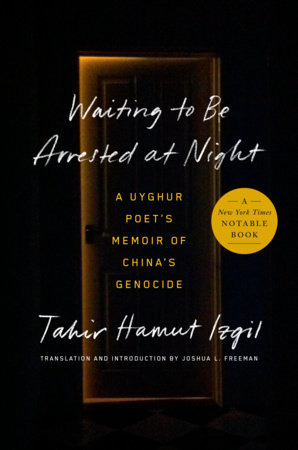How One Power Outage Revealed My Lack of Apocalypse Preparation
What last weekend's planned power outage in Colorado taught me about my lack of end-time preparation & how I'm going to settle all literary beefs by translating them into graffiti writer terms.
On April 6, a windstorm blew through Colorado with category 2 hurricane-force gales, peaking at 97 miles an hour near my house. Meteorologists had predicted its arrival days in advance, so we were all bracing for it, especially given how jittery we still were from the Marshall Fire, a wind-fueled conflagration which destroyed a thousand homes and came within a half mile of my neighborhood two years ago. Xcel Energy’s negligence was one of the causes of the fire, and some residents have sued. Still, when Xcel emailed to provide two hours notice before they pulled the plug, I responded according to the worst stereotypes of how an English major might react to an emergency.
Our power went out at 3 p.m. on Saturday. Even though I knew this was a possibility, and I’d charged up my phone and computer, it wasn’t until the power was actually out that I realized how unprepared I was. It occurred to me that the sun would be setting soon, so I scurried around to find all the flashlights and lanterns. Here’s the sorry assemblage I came up with:
Three hand-powered flashlights the kids won from the Boulder Public Library’s summer reading program five years ago. If you frantically pump them, a dim beam emerges, strong enough to confirm, say, that you still have a thumb attached to your hand.
Seven sundry tiny tea lights, all with dead batteries.
Two festive strings of battery-powered mini paper lanterns, one of which would never light again after a battery leak.
We also had two or three crappy flashlights my husband brought home from an office white elephant gift exchange—none of them worked. Everything that needed a battery was burned out. So I spent one of the last hours of precious daylight digging around a junk drawer to find batteries, then using a tiny screwdriver to install them in the tea lights.
When I had everything charged, all of it together emitted about a half-dozen fireflies-worth of illumination. We wouldn’t be able to see anything, but the ambiance would be stellar. I thought, why have I never bought one proper, high-powered flashlight? A solid metal beam that would guide my way in my hour of need and double as half a nunchuck? Am I even an adult?
As my teenagers watched my frantic, pathetic efforts, I could pinpoint the precise moment when they lost all remaining faith in my parental guidance. While our neighbor’s generator whirred contentedly next door, in a few hours, we would be going full blackout.
My husband realized the contents of our refrigerator would spoil, so he took my son out on a quest to find ice. The convenience store clerks all but laughed at them. All the ice in town had been purchased hours earlier by our neighbors who had keener survival instincts than we did.
My husband located three headlamps, which we donned. My daughter fled to her friend’s house one town over, where they had power and wifi and warm food. I could try to make the rest of us some kind of cold, jerky-involved dinner, but instead we decided to leave too. We drove to north Boulder, where they still had power, and ate at a Nepali restaurant. Then we hung out under the florescent lights of my husband’s office and watched basketball on my computer, because we were wimps. In our dark, heat-free, internet-less home, we had no way to learn any news about when our predicament would end or what was going on with the weather because I’d also failed to acquire one of those battery-powered radios that emergency preparedness lists urge non-English majors to buy. (If these lists were intended for English majors, they’d be better written.)
In my dark house that night as I read Miranda July’s awesome forthcoming novel All Fours in the light of my headlamp, I wondered, how long would I survive in an apocalypse? A fortnight if I was lucky. What did I have to offer the post-civilization world? Well, I’d just been to Costco, where I’d loaded up on industrial-sized non-perishable snacks.
If this had been the actual end of all power, I could barter, offering cupfuls from the jumbo boxes of Cheerios in exchange for the more useful survival items my prepper neighbors had hoarded. But the Cheerios would soon give out, so I’d have to also start operating a lending library with the thousands of books in my house.
No one would want books at first—they’d come only for the Cheerios. But eventually boredom would set in from lack of access to television, internet, and music. They’d need the knowledge, entertainment, and good company my books provided. They’d come, bringing jerky and antibiotics, and leave with some Tolstoy or Sloane Crosley.
This was my apocalypse plan. In this way, my family and I would not perish immediately. When the lights came on again, I’d tell it to my children. Still, somehow I doubted my Cheerios-and-books scheme would restore their faith in me.
Power returned to us after 30 cold, dark hours, and I swear I’m on my way to buying that huge flashlight. In a minute.
The Assorted Whimsy Portion of The Tumbleweed
One of the reasons I remain on Twitter is because it’s one of the only places that sustains hearty literary beefs. A few minor beeflets have surfaced on Threads, Bluesky is still sputtering to life, but still, most of the Prime Cut, Grade-A Literary Beefs are sparked by Twitter.
Hopefully you are pure of intention and consumption, and have no idea what a literary beef is. My sainted friend, I will explain: a literary beef is any kind of disagreement that arises within the writing and publishing community, normally so obscure it would take you about an hour of explanatory preamble to bring a non-writer up to speed on it. Literary beefs breakdown in this manner:
10% Joyce Carol Oates-related
20% New York vs. MFA
15% Outrage at personal essays published in The Cut or New York Times
10% Literary Scofflaws: Plagiarists, imposters, dastardly contest proprietors who abscond with entry fees, mustache-twirling blackguards
45% Miscellany
This week a beef arose that fell into the latter category. It involved a writer who joyfully shared that she’d been submitting for a year, and she’d published 50 pieces in various literary magazines.
Immediately, the Twitter buzzards came for this prolific youngster, scolding her for various reasons. Some doubted her veracity. Others dissed the quality of the lit mags she was submitting to, in posts such as this one:
This tweeter went on:
Now, calling any literary publication “slop” is really asking for it. It’s like talking trash about somebody’s mama, which you just shouldn’t do, even if that mama’s plan for apocalypse survival involves Cheerios and a lending library. But that’s beside the point. The point is, graffiti artists settled this particular beef years ago. We book writers don’t need to beef it out again.
Here’s the graffiti writer’s rubic. All of these achievements are equally laudable:
Creating a “piece” (aka masterpiece). A large-scale, multi-dimensional mural. A major work that takes a good amount of time.
Getting up in “heaven spots”- leaving work in challenging-to-reach places that a lot of people see—billboards, the tops of buildings, etc., like this fabulous work in Los Angeles recently.
“Going All City”: leaving your tag all over town, in as many places as possible.
So, our young writer who hit 50 lit mags in one year? She has gone all city, and kudos to her. She writes a lot of flash pieces, she appeals to a lot of editors, and she’s doing the thing. Plus, Clash Books will soon publish her first novel.
The elder writer who chided her? She values pieces, not tags. To each her own.
The heaven spot writers weren’t involved in this dispute—those are the writers who divulge their shocking personal lives in The Cut.
Listen to the graf writers: all three goals are valid. Pat yourself on the back if you hit any one of them. Long may your work burn.
The Book Recommendation Portion of The Tumbleweed
One of my favorite activities these past several years has been participating on the National Book Critics Circle’s John Leonard Prize committee. The award is for best first book in any genre, and I love feasting on the finalists. I wholeheartedly recommend our winner, Waiting to Be Arrested at Night: A Uyghur Poet's Memoir of China's Genocide by Tahir Hamut Izgil.
This book is a thinking-person's page-turner. I was struck by what a miracle it is that this book even exists. It's impossible to glean accurate information about the persecution the Uyghurs face from within China. The prose is clear, direct and beautiful. It read like a psychological thriller, and I conveyed how deeply Izgil wished he could just live in peace in his homeland and celebrate Uyghur poetry with his friends and family. My kids have been grumbling over their high school’s required reading of 1984—I think Izgil's book would make a fantastic update of that assignment, as it shows so many similar mechanisms of government control. This book is so heartfelt, urgent, and rare. It may be one of the few enduring testaments of a people who is being wiped out of their homeland.
The Happenings & Links Portion of The Tumbleweed
My new Lighthouse Writers Workshop called “Get a Little Closer: Psychological and Emotional Writing for Fiction and Nonfiction” that starts tonight is sold out! Thank you so much for signing up.
Reading Den is going strong, packing eager literary types in to Fort Greene Bar during its first two sessions. The next reading is April 24 and features Joe Fassler, Caitlin Barasch, Patricia McCrystal, and Ahja Fox. And guess what? I’ll be reading something or other for the May gathering, on May 29. The other readers will be announced at the April event.
Lighthouse Writers Workshop’s Lit Fest is coming in June, and you can register now for all the great classes and readings. I’m teaching four classes and I’d love to see you there! (Some of these are selling like hot cakes, and some are selling like not cakes, so maybe sign up right away? Or maybe just wait, it will probably be fine.)
Getting Published: Stories, Essays, Articles and Books, Friday June 7, 9-11 a.m.
Freelance Writing: Getting Started and Building Your Career, Friday, June 7, 1:30-3:30 p.m.
The Devil Made Me Do It: Using Folktale Forms to Structure Your Writing, Thursday, June 13, 4-6 pm.
Two-Faced: The Art of Multiple Perspectives, Friday, June 14, 1:30-3:30 p.m.
I'll also be participating on this lunchtime business panel:
Contests, Residencies, and More: Ways to Get Out There, Sunday, June 9, 12-1 p.m.
And I’ll be reading in celebration of the release of a new anthology with an essay of mine in it:
Anthology Release: We Can See Into Another Place: Mile-High Writers on Social Justice, Saturday, June 8, 5:30 p.m.
Have you written a short story collection? If so, why not enter it in the prestigious Flannery O’Connor Award for Short Fiction? I am honored to serve as one of the judges this year, reading through entries to pick some fabulous ones for series editor Lori Ostlund to consider. The contest runs from April 1 to May 31 and all entries are judged without author-identifying info attached. Give it a try!
As always, The Tumbleweed welcomes your questions and comments about writing, reading, taco eating, the Denver Nuggets, rabbit wrangling, Deion Sanders, and baby seals.









Jenny this is so great! Glad you posted on FB! You can come to my house for the Armageddon. I am very weirdly prepared. Since Covid. The only thing we don’t have are guns. But, it’s not off the table for hunting….
I enjoyed this (master) piece. So relatable and humorus.
Dave Wann, author of Simple Prosperity